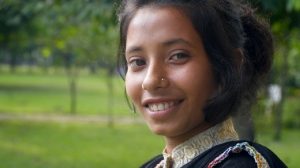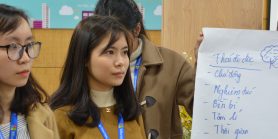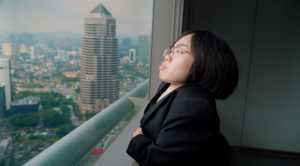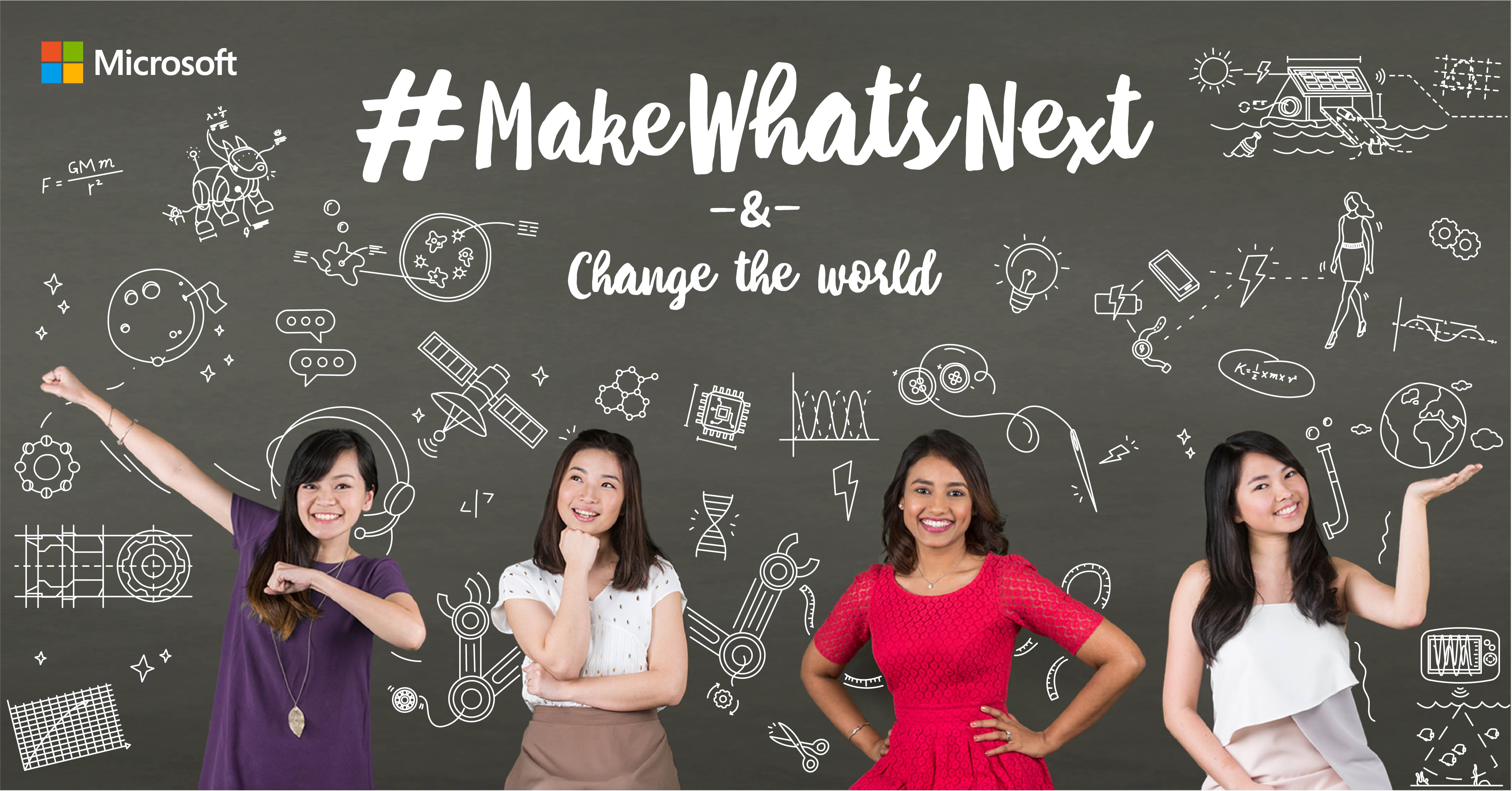To mark International Women’s Day, Microsoft will be driving multiple events and programs at its offices, as well as in schools and with public and private partners to launch the #MakeWhatsNext campaign. The campaign aims to encourage young women to pursue careers in Science, Technology, Engineering and Math (STEM).
Inspiring Young Women to Positively Shape the Future through STEM in Asia
Today, the number of women pursuing STEM education and careers is still low despite technology making tremendous progress over the last few decades. UNESCO’s Institute for Statistics (UIS) estimates that only 23% of researchers in East Asia and the Pacific are women[1] and only 35% of all students enrolled in STEM-related fields of study are female[2].
One of the reasons for this gender imbalance in STEM subjects is the lack of role models for young women to be inspired by, hampering their confidence in pursuing careers in those sectors. In fact, only 1 in 4 girls aged between 12 to 19 years of age in the region[3] know a female public figure in the fields of STEM.
“We want to change the way young women view STEM by letting them envision how technology, science, engineering can be tools used to solve global challenges; how their interests today could turn into a job of the future. We’re inviting girls to explore their passions further and gain insights from LinkedIn on how to make their dream job a reality. To make it happen, we are introducing all girls, including those from underserved communities, to female role models from different industries as well as hands-on, purpose-driven experiences where STEM concepts are linked to real-life situations,” said Dr. Daiana Beitler, Philanthropies Director, Microsoft Asia.
To mark International Women’s Day, Microsoft will be releasing a micro-film profiling five extraordinary female role models from Asia who are using STEM to invent new ways to change the world. Among them, Melisha Ghimere, co-founder of Echo Innovators and Microsoft’s Imagine Cup finalist, has developed the FarmLi solution for farmers in Nepal to better manage their livestock and increase food security; Mikaela Jade, an entrepreneur who is preserving Indigenous culture with augmented reality apps that bring Indigenous stories to life; and Felicia Chua, COO from Coding Garage, who is building the next generation of innovators through computer science education for all.
Engaging Young Women in Singapore to #MakeWhatsNext with Partner Organizations
In Singapore, more than 140 secondary school girls and educators from 15 schools and nonprofits will take part in DigiGirlz on March 8. This signature event is designed to encourage participants to #MakeWhatsNext and shape their future with STEM. Getting more women into STEM requires a holistic, integrated and forward-looking response that spans across sectors. Hence for the first time this year, Microsoft is conducting DigiGirlz in partnership with LinkedIn – where the event will be hosted – along with Coding Garage, Grab, Johnson & Johnson, and Shell.. (Please refer to addendum for supporting quotes)
DigiGirlz will give participants the opportunity to hear from women working in STEM-related industries, to envision their careers and acquire new skills. Wendy Johnstone, General Manager, Marketing and Operations for Microsoft Asia Pacific, will moderate a panel discussion with Hooi Ling Tan, Co-Founder from Grab; Sipika Singh, Director of Business Transformation, Johnson & Johnson; Ara Cho, Data Analyst from LinkedIn; Janice Lim, Process Technologist from Shell, and Soon Hyung Hwang, Industry Solutions Executive from Microsoft. The panel will also be broadcasted on the Microsoft Singapore Facebook page from 13:45 to 14:30 (GMT+8).
“The stereotype that only men can excel in the tech and engineering industries is wrong. In this digital age, the future career opportunities will be in STEM, and we have a responsibility to encourage and support young women to follow this path. By choosing a career in STEM, young women and men will achieve their true potential and help change the world.” said Wendy Johnstone, Microsoft General Manager, Marketing and Operations.
Young women will also be invited to envision their career profile in five years’ time with an interactive session run by LinkedIn, and acquire skills of the future with a new workshop on mixed reality by Coding Garage. They will finally be mentored by more than 40 employees from all partner companies, who will advise them on their next steps. Mentoring appears to be particularly beneficial for girls as it enhances their confidence and motivation, and improves their understanding of STEM careers.
Inspiring Girls in Asia to Shape Their Future with #MakeWhatsNext
Microsoft, along with partners from both public and private sectors, are driving activities to inspire girls to pursue their passion in STEM across the entire region – even beyond March 8.
These activities address three key areas to encourage women to step into STEM-related careers:
1. Increasing exposure to role models in STEM
2. Creating opportunities for hands-on experiences that show how STEM can shape the future
3. Helping individuals to envision a future with STEM
| Inspiring the next generation with female and male role models |
|
| Experience STEM through hands-on, purpose-driven activities |
|
| Envisioning a future with STEM |
|
An addendum on Microsoft’s activities in the region that in support young women to carve a future with STEM is also included below.
To learn more about #MakeWhatsNext, visit http://www.makewhatsnext.com/.
To find out more about Microsoft Philanthropies’ initiatives in Asia, visit https://news.microsoft.com/apac/philanthropies-asia/.
ADDENDUM 1 – Supporting Quotes
_
Felicia Chua, Co-Founder and Chief Operating Officer, Coding Garage
“I believe that every girl should be able to learn computer science at the earliest opportunity, because Code is the language of the future. I see girls getting future-ready, as their creativity, collaboration and problem-solving skills are developed through learning to code.”
Hooi Ling Tan, Co-Founder, Grab
“At Grab, we’re proud to have women make up 40% of our team. We design our system to be a meritocracy for people of different talents, experiences and qualities. By surrounding ourselves with a diverse set of talent, it brings all of us to bolder heights and enables us to become more self-aware, nuanced leaders.”
Sipika Singh, Director, Business Transformation, Johnson & Johnson
“Having more girls in STEM jobs is a win-win. Not only is diversity needed to drive innovation more effectively but also with the increasing recognition amongst employers, young women who join the work force today will have better prospects for career advancements. In healthcare specifically, there is an even bigger need for women leaders to be in the forefront – right from the scent and sensitivities for a face cream, dosage variability for drugs, to simply the enhanced rewards of more compassion in management – it’s the only holistic approach to more effective organizations!”
Janice Lim, Process Technologist, Shell
“Technology and innovation are fundamental to bringing forth step changes in improving lives around the world. In Shell, technology also enables women to play an increasingly important role in bringing more and cleaner energy solutions. The unique attributes of women enhance their STEM skills to make them as valued contributors as their male colleagues in the energy industry.”
ADDENDUM 2
Helping Young Women Make a Difference in STEM
At Microsoft, we believe that when we encourage young women to pursue STEM, we double the potential to solve problems. Here are some exemplary women who have made the difference and taken the step to change the world by embracing STEM:
 In Bangladesh, 52% of girls under 18 in Bangladesh are girl brides – one of the highest rates in the world. Fortunately for Fatema, she did not end up as a number in this statistic. Aashar Alo Patshala – a nonprofit that teaches digital skills with Microsoft’s support – snatched her away from her arranged marriage. Converting a traumatic event into a well of strength, Fatema now teaches digital literacy to girls in her village.
In Bangladesh, 52% of girls under 18 in Bangladesh are girl brides – one of the highest rates in the world. Fortunately for Fatema, she did not end up as a number in this statistic. Aashar Alo Patshala – a nonprofit that teaches digital skills with Microsoft’s support – snatched her away from her arranged marriage. Converting a traumatic event into a well of strength, Fatema now teaches digital literacy to girls in her village.
 Growing up, Pham Thu Huong from Vietnam had almost never laid her hands on a computer. With the support of Microsoft’s YouthSpark scholarship, she recently wrapped up her college degree in computer science, and is eager to try her hand at writing code for a video game. She is now contemplating a job as a software test engineer with Toshiba Vietnam, the Japanese tech giant.
Growing up, Pham Thu Huong from Vietnam had almost never laid her hands on a computer. With the support of Microsoft’s YouthSpark scholarship, she recently wrapped up her college degree in computer science, and is eager to try her hand at writing code for a video game. She is now contemplating a job as a software test engineer with Toshiba Vietnam, the Japanese tech giant.
Michiyo Arai from Japan is breaking conventions by embracing telework, a relatively new concept for Japanese workers. Workplaces in the country still practice traditional office culture with fixed working hours. Through Microsoft YouthSpark program, Michiyo was enrolled in a telework internship and is now taking part in a government vocational training course on web development.
from Japan is breaking conventions by embracing telework, a relatively new concept for Japanese workers. Workplaces in the country still practice traditional office culture with fixed working hours. Through Microsoft YouthSpark program, Michiyo was enrolled in a telework internship and is now taking part in a government vocational training course on web development.
 Living with Morquio Syndrome, a rare degenerative condition, has not stopped Rachel Siew from finding her niche and making her voice heard. As an M-Powered Ambassador and the author of the book “Little Book, Big Secrets”, Rachel is looking to empower and inspire others with special needs to see their value in the society.
Living with Morquio Syndrome, a rare degenerative condition, has not stopped Rachel Siew from finding her niche and making her voice heard. As an M-Powered Ambassador and the author of the book “Little Book, Big Secrets”, Rachel is looking to empower and inspire others with special needs to see their value in the society.
 Closer to Microsoft, Alyssa Ong first foray into a tech career started when she was a Microsoft Student Partner (MSP) back in 2015. The program empowers MSPs like Alyssa to share their deep knowledge and passion for technology with fellow students. Alyssa recently joined Microsoft as a Software Engineer, as part of the Microsoft Academy of College Hires (MACH) program for young graduates. “Being able to code rocks because it gives you the freedom to build awesome stuff that no one else has before,” Alyssa shares.
Closer to Microsoft, Alyssa Ong first foray into a tech career started when she was a Microsoft Student Partner (MSP) back in 2015. The program empowers MSPs like Alyssa to share their deep knowledge and passion for technology with fellow students. Alyssa recently joined Microsoft as a Software Engineer, as part of the Microsoft Academy of College Hires (MACH) program for young graduates. “Being able to code rocks because it gives you the freedom to build awesome stuff that no one else has before,” Alyssa shares.
[1] UNESCO Institute for Statistics, Women in Science
[2] UNESCO, Cracking the code: Girls and women’s education in science, technology, engineering and mathematics (STEM)
[3] Mastercard, Low Confidence Limits Number of Girls Pursuing STEM Careers in Singapore: Inaugural MasterCard Study





